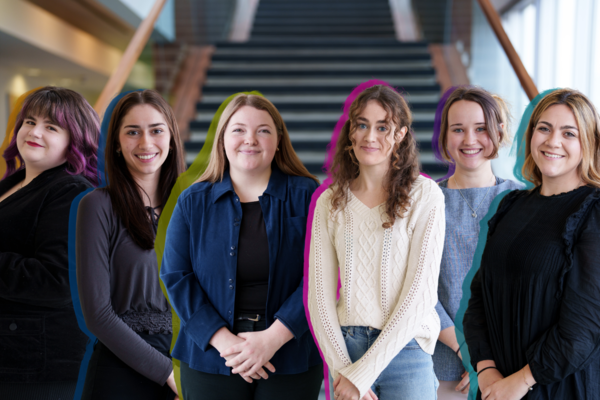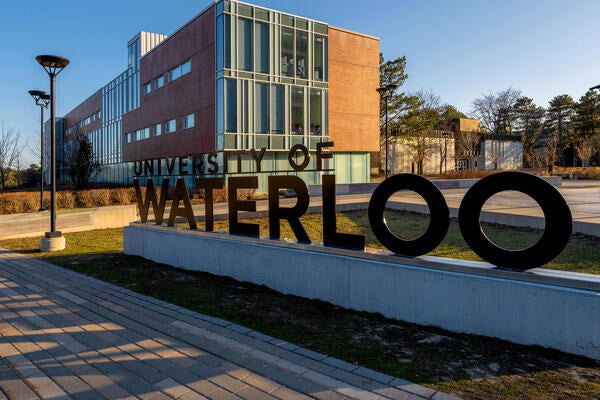
Building a bridge for the new "international scientist"
Waterloo and Bordeaux partnership creates a bio-chemistry program that will support research into sustainable alternatives to fossil fuels

Waterloo and Bordeaux partnership creates a bio-chemistry program that will support research into sustainable alternatives to fossil fuels
By Christian Aagaard Marketing and Strategic CommunicationsA partnership between two international research leaders aims to create a new kind of scientist — one whose education and experience crosses disciplines and international boundaries.
The University of Waterloo and Université de Bordeaux begin a longer conversation about combining strengths with a joint conference, taking place May 19 to 21 in Waterloo.
The conference has three main goals:

Bio-based chemistry looks for sustainable alternatives — trees and algae, for example — to replace fossil fuels as the prime raw material for polymers, surfactants and other chemicals.
“The complexity is greater,’’ says John Honek, chair of Waterloo’s Department of Chemistry in the Faculty of Science. “You can’t just drill a hole in the ground and have things shoot out.
“We are trying to create the international scientist who fully understands the chemistry, and will be able to design new chemistry that will handle bio-based materials. And, in addition, not be afraid of spinning off companies, working on patents and so forth.”
Waterloo president Feridun Hamdullahpur will be joined Tuesday by Jean-François Casabonne Masonnave, France’s consul general in Toronto, and Laurent Servant, Bordeaux’s vice-president, international, to sign a letter of intent to set up the bio-based chemistry program. Students in the undergraduate Bachelor of Science program will be expected to complete courses at the two institutions through distant education and e-learning, with on-campus exchanges in the fourth year.
“Bordeaux is a good fit because it has many of the areas of expertise and excellence that we find at Waterloo — chemistry, systems design, mathematics, aging, water management,’’ says Eric Prouzet, a professor in Waterloo’s Department of Chemistry.
“We want to collaborate with Bordeaux because it is involved in European programs and associated with major projects right now. Bordeaux is the front door to Europe.”
Prouzet is the lead organizer of Waterloo-Bordeaux: Path to a Privileged Partnership. The conference takes place in the Mike & Ophelia Lazaridis Quantum-Nano Centre (QNC), which houses the Institute for Quantum Computing and the Waterloo Institute for Nanotechnology.
The conference covers a wide range of interests: Aging, nanotechnology, energy consumption, smart resource management, biotechnology and maintaining a safe and sustainable water supply.
“We identified those disciplines where we are very good, and they (Bordeaux) are very good, and by working together, we’ll add things that we could not do on our own,’’ says Nello Angerilli, Waterloo’s vice-president, international. "Each institution will benefit . . . The sum will be greater than the parts.”
Scientific communities are not all alike, and there is value in learning about those differences, says Irene Goldthorpe, one of the presenters at the conference.
An assistant professor in Waterloo’s Department of Electrical and Computer Engineering, Goldthorpe will discuss the work she does in nanotechnology with invisible-to-the-eye filaments of silver.
It falls under the “functional materials” portion of conference. Imbedded into glass or plastic, these nanowires conduct electricity. That opens possibilities for such things as lightweight, flexible solar panels and displays.
In North America, Goldthorpe says, research tends to be more of an independent venture, with professors setting up their own labs and research groups. In Europe, research often happens in large, team-based settings.
“If you can collaborate more, you can achieve a lot more,’’ she says. “You can get the right set of skills . . . We’re exchanging research ideas, but there is also the cultural thing about how research is done.”
Students would be among the biggest winners of closer ties with Bordeaux, says Prouzet. By learning the “best practices” of two countries, he says, and working in different academic and social cultures, they will come out better prepared for a global work environment.
The Waterloo-Bordeaux conference is expected to draw about 100 researchers and other delegates.
“We want them to interact, to come with ideas and solutions, and ask what do we can do next, together,’’ Prouzet says.

Read more
Waterloo announces winners of annual award for co-op students from each of the six faculties

Read more
Fifty-six researchers receive Government of Canada funding to solve some of humanity’s most critical problems

Read more
Here are the people and events behind some of this year’s most compelling Waterloo stories
The University of Waterloo acknowledges that much of our work takes place on the traditional territory of the Neutral, Anishinaabeg and Haudenosaunee peoples. Our main campus is situated on the Haldimand Tract, the land granted to the Six Nations that includes six miles on each side of the Grand River. Our active work toward reconciliation takes place across our campuses through research, learning, teaching, and community building, and is co-ordinated within the Office of Indigenous Relations.